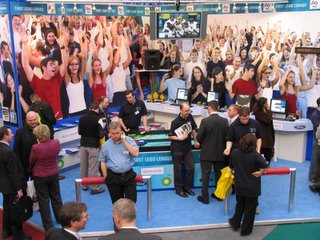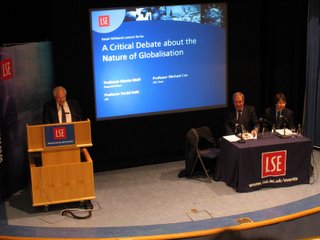Two good restaurants that I have tried several times over the years with great delight. High quality, personality, reasonable prices, lots of people:
For Sushi:
Hasaki, 210 east 9th. st.
Right by skt. Marks square
For Mexican:
La Palapa Rockola, 359 sixth ave.
Between Washington place and west 4th. st.
Saturday, January 28, 2006
Friday, January 27, 2006
Thursday, January 26, 2006
Democratic dilemma
So, now that Hamas has been voted into power in Palestine, president Bush faces the same dilemma that many of us feel about him: We believe in democracy, but we sometimes feel extremely uncomfortable with those that get elected.
Podcasts. from Davos

Just in case you can't get your helicopter started to go in person, most of the sessions are being podcast - here's the menu to choose from.
Saturday, January 21, 2006
What makes information valuable?
A few more thoughts on Apple I-life 06.
To me it’s significant because it brings us further ina development that is changing the media and the ways in which we use it. The tools we use for the most part to produce media where developed according to a paradigm where information was mainly something you created and transmitted – or you recieved and consumed it. It was a step by step process, mostly one way.
But a tool like I-life 06 reflects and promotes a differenct paradigm. It takes it for granted and it encourages you to use media in a new way.
You know:
Where Information is created and exchanged as a conversation with a potentially very large network of participants – rather than producers and consumers.
Where each information unit is treated as a component that can be reused, changed, combined with other units, tagged, commented, linked.
So, information is flow, information is under development, information is participatory.
As our tools are changed to fit this paradigm, I think we will start to think differently about what makes information valuable. New qualities will become important, such as:
- open code
- easy to pass on and recombine
- standardized format
- receptive to tags and meta data
- with a community around it
And, it seems that very similar considerations will apply to every business and realm where digital technology is a dominant part of the value creation.
To me it’s significant because it brings us further ina development that is changing the media and the ways in which we use it. The tools we use for the most part to produce media where developed according to a paradigm where information was mainly something you created and transmitted – or you recieved and consumed it. It was a step by step process, mostly one way.
But a tool like I-life 06 reflects and promotes a differenct paradigm. It takes it for granted and it encourages you to use media in a new way.
You know:
Where Information is created and exchanged as a conversation with a potentially very large network of participants – rather than producers and consumers.
Where each information unit is treated as a component that can be reused, changed, combined with other units, tagged, commented, linked.
So, information is flow, information is under development, information is participatory.
As our tools are changed to fit this paradigm, I think we will start to think differently about what makes information valuable. New qualities will become important, such as:
- open code
- easy to pass on and recombine
- standardized format
- receptive to tags and meta data
- with a community around it
And, it seems that very similar considerations will apply to every business and realm where digital technology is a dominant part of the value creation.
Meme watching
Friday, January 13, 2006
The means to build and access the global brain
No, it’s not just a fancy metaphore. We are building a global brain, connecting the neurons by our collective efforts to put knowledge online, connecting sensors to the net, tagging, aggregating, commenting, linking, concluding...
We’ve been at it for a long time. Maybe it started with the passing of knowledge and stories between generations, it gained speed with the ability to draw and write to store and transmit information, - and you the rest: Things are accellerating, with more connections, better tools.
And it’s real. Real knowledge, real inventions, valuable insights emerge as people connect the dots and exchange information.
It’s almost banal, but we are collectively enhancing our cognitive abilties through our increasing participation in this emerging global organism.
Much has been said about using genetics and nanotech to enhance humans, but in fact we’re doing it all the time. Our cognitive and sensory abilities are very directly related to the degree to which we use information technology. And we’ve long since passed the point where we could do without it.
We’ve been at it for a long time. Maybe it started with the passing of knowledge and stories between generations, it gained speed with the ability to draw and write to store and transmit information, - and you the rest: Things are accellerating, with more connections, better tools.
And it’s real. Real knowledge, real inventions, valuable insights emerge as people connect the dots and exchange information.
It’s almost banal, but we are collectively enhancing our cognitive abilties through our increasing participation in this emerging global organism.
Much has been said about using genetics and nanotech to enhance humans, but in fact we’re doing it all the time. Our cognitive and sensory abilities are very directly related to the degree to which we use information technology. And we’ve long since passed the point where we could do without it.

The BETT show, supposedly the worlds largest show on IT and education. I can testify; it IS big. The usual tradeshow madness, this one takes place at Londons olympia hall.
It’s a weird experience: it’s the place where all the teachers that are computer literate and really try to push the envelope, and it’s completely packed with companies that develop educational solutions that use computers in all kinds of clever ways. So it’s like, computers are a natural tool in classrooms, and kids can benefit tremendously from using their laptops, mobile phones, blogs, game consols etc. as an integrated part of learning.
And yes, I totally believe in that. But the BETT show is like a parallel reality. We all get it here. But if you look at the reality of the school that my kids attend it’s a very different story – a story where classrooms and the way kids learn is pretty much the same as when I was a child - way back in the industral society.
A few findings:
- Smartboard, the leading manufacturer of .. well, smart boards, told that they have sold 375.000 boards worldwide so far – 125.000 of those in the UK.
But first of all, Apple was showing i-life 06. To me it’s a work of genius. It’s a pleasure to sense the intellect behind it. The integration of podcasting/RSS subscription and the continued seamless and totally, wonderfully easy integration of all media... it’s exactly what we’ve hoped for, but haven’t quite seen.
A lot has been written about the transition to Intel processors, and, yes, it adds speed and probably decreases incompatability, but to me the really significant part is the vision of the new i-life. It takes Apple to a new level, way ahead of the pack.
More on this later. Gotta get some sleep.
Thursday, January 12, 2006
LSE - gotta go

When in London I always check out the events program at LSE, the London School of Economics. Some of the talks there are amazing, the most powerful people and the best minds of the planet presenting in a civilized academic atmosphere in the delightfully old-fashioned Hong Kong Theatre. Tonight it was Martin Wolf, editor and commentator at Financial Times, and LSEs own David Held discussing the consequences of globalization.
Wolf, the liberalist, argued that markets will determine pretty much everything.
Held, describing himself as a ”cosmopolitan social democrat, argued that we still need ideology. He feels that we can influence where the world is heading by insisting on certain universal values, such as human rights, social justice and environmental protection.
I’m on David Helds side.
Let me highlight two upcoming LSE events:
On february 15th Ulrich Beck will speak on ”Living in the world risk society”, and on march 16th. Richard Dawkins, Dan Dennett and Matt Ridley will discuss Dawkins book ”the selfish gene” on the 30th anniversary of its publishing.
... And there’s so much more. All free, I should add. A treat!
Monday, January 09, 2006
Sunday, January 08, 2006
Ugly dog
Tuesday, January 03, 2006
Energy too cheap to meter
I’ve been reading up on energy policy lately – it’s important stuff. One piece that really sticks out is Peter Schwartz’ glowing presentation of ”How clean, green atomic energy can stop global warming” in Wired Magazine some months back.
There’s something very attractive about the spirit of optimism and the drive towards a bigger, better future that Peter Schwartz and GBN a
argues so compellingly for in his papers – like the ”Long boom” vision back in the pre-dot.com crash days.
There’s a very important component in Schwartz’ article: it offers a vision that you want to believe in and pursue. Try to read the final paragraph of his article:
” The more seriously you take the idea of global warming, the more seriously you have to take nuclear power. Clean coal, solar-powered roof tiles, wind farms in North Dakota - they're all pie in the emissions-free sky. Sure, give them a shot. But zero-carbon reactors are here and now. We know we can build them. Their price tag is no mystery. They fit into the existing electric grid without a hitch. Flannel-shirted environmentalists who fight these realities run the risk of ending up with as much soot on their hands as the slickest coal-mining CEO.
America's voracious energy appetite doesn't have to be a bug - it can be a feature. Shanghai, Seoul, and São Paolo are more likely to look to Los Angeles or Houston as a model than to some solar-powered idyll. […]
Nuclear energy is the big bang still reverberating. It's the power to light a city in a lump the size of a soda can. Peter Huber and Mark Mills have written an iconoclastic new book on energy, The Bottomless Well. They see nuclear power as merely the latest in a series of technologies that will gradually eliminate our need to carve up huge swaths of the planet. "Energy isn't the problem. Energy is the solution," they write. "Energy begets more energy. The more of it we capture and put to use, the more readily we will capture still more."
Wouldn’t it be wonderful! The way I read it, these sentences argue that energy consumption is at the heart of our civilization. The more energy we consume, the more powerful, comfortable and generally highly developed we become. We should harness and use energy freely, apply it in abundance to amplify our power and continued progress from primitive being to some yet unknown ever-evolving superior state of humanity.
We’re just not going to get off the ground unless we exploit the ressources around us.
In a way I agree. We’ve gotta move forward, and I enjoy a nice warm house, jet travel and global consumer choices as much as anyone. Energy is the key to all of this.
Here’s another quote:
”Wouldn't it be a blast to barrel down the freeway in a hydrogen Hummer with a clean conscience as your copilot? Or not to feel like a planet killer every time you flick on the A/C? That's how the future could be, if only we would get over our fear of the nuclear bogeyman and forge ahead - for real this time - into the atomic age.
If only our energy consumption didn’t wreck the biosphere. If only nuclear energy really were as un-problematic as Peter Schwartz argues that it is.
My fear is that there ARE serious hidden costs – and not just in terms of pollution and security, but more fundamentally with the materially focused, get-ahead-culture that his words project.
It’s great to make a splash and deem it progress, but if it leaves everybody else worse off, and in fact corrodes our common basis of existence, maybe it would be better to focus less on transcending the human condition and fullfiling consumer fantasies – and concentrate more on simply keeping our civilization going through what could be a very severe situation.
You can’t save your way to grandeur. Maybe we need to ”forge ahead into the atomic age” in order not to be swamped by the problems we have created on our way to here. But then again, maybe there’s a more nuanced way of proceeding: acknowledging that there’s more to life than barreling down the freeways; some values that are not as dependent on massive injections of energy.
Yes, I’m split, confused, scared and tempted.
... a final comment: To some extent we all have our opinions shaped by who’s paying the bill. Reading his articles in Wired magazine one should be aware that this is not written a journalist. I can’t help wonder who Peter Schwartz’ clients are – a little disclosure would make it easier to asses the paper.
There’s something very attractive about the spirit of optimism and the drive towards a bigger, better future that Peter Schwartz and GBN a
argues so compellingly for in his papers – like the ”Long boom” vision back in the pre-dot.com crash days.
There’s a very important component in Schwartz’ article: it offers a vision that you want to believe in and pursue. Try to read the final paragraph of his article:
” The more seriously you take the idea of global warming, the more seriously you have to take nuclear power. Clean coal, solar-powered roof tiles, wind farms in North Dakota - they're all pie in the emissions-free sky. Sure, give them a shot. But zero-carbon reactors are here and now. We know we can build them. Their price tag is no mystery. They fit into the existing electric grid without a hitch. Flannel-shirted environmentalists who fight these realities run the risk of ending up with as much soot on their hands as the slickest coal-mining CEO.
America's voracious energy appetite doesn't have to be a bug - it can be a feature. Shanghai, Seoul, and São Paolo are more likely to look to Los Angeles or Houston as a model than to some solar-powered idyll. […]
Nuclear energy is the big bang still reverberating. It's the power to light a city in a lump the size of a soda can. Peter Huber and Mark Mills have written an iconoclastic new book on energy, The Bottomless Well. They see nuclear power as merely the latest in a series of technologies that will gradually eliminate our need to carve up huge swaths of the planet. "Energy isn't the problem. Energy is the solution," they write. "Energy begets more energy. The more of it we capture and put to use, the more readily we will capture still more."
Wouldn’t it be wonderful! The way I read it, these sentences argue that energy consumption is at the heart of our civilization. The more energy we consume, the more powerful, comfortable and generally highly developed we become. We should harness and use energy freely, apply it in abundance to amplify our power and continued progress from primitive being to some yet unknown ever-evolving superior state of humanity.
We’re just not going to get off the ground unless we exploit the ressources around us.
In a way I agree. We’ve gotta move forward, and I enjoy a nice warm house, jet travel and global consumer choices as much as anyone. Energy is the key to all of this.
Here’s another quote:
”Wouldn't it be a blast to barrel down the freeway in a hydrogen Hummer with a clean conscience as your copilot? Or not to feel like a planet killer every time you flick on the A/C? That's how the future could be, if only we would get over our fear of the nuclear bogeyman and forge ahead - for real this time - into the atomic age.
If only our energy consumption didn’t wreck the biosphere. If only nuclear energy really were as un-problematic as Peter Schwartz argues that it is.
My fear is that there ARE serious hidden costs – and not just in terms of pollution and security, but more fundamentally with the materially focused, get-ahead-culture that his words project.
It’s great to make a splash and deem it progress, but if it leaves everybody else worse off, and in fact corrodes our common basis of existence, maybe it would be better to focus less on transcending the human condition and fullfiling consumer fantasies – and concentrate more on simply keeping our civilization going through what could be a very severe situation.
You can’t save your way to grandeur. Maybe we need to ”forge ahead into the atomic age” in order not to be swamped by the problems we have created on our way to here. But then again, maybe there’s a more nuanced way of proceeding: acknowledging that there’s more to life than barreling down the freeways; some values that are not as dependent on massive injections of energy.
Yes, I’m split, confused, scared and tempted.
... a final comment: To some extent we all have our opinions shaped by who’s paying the bill. Reading his articles in Wired magazine one should be aware that this is not written a journalist. I can’t help wonder who Peter Schwartz’ clients are – a little disclosure would make it easier to asses the paper.
Subscribe to:
Comments (Atom)






